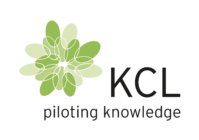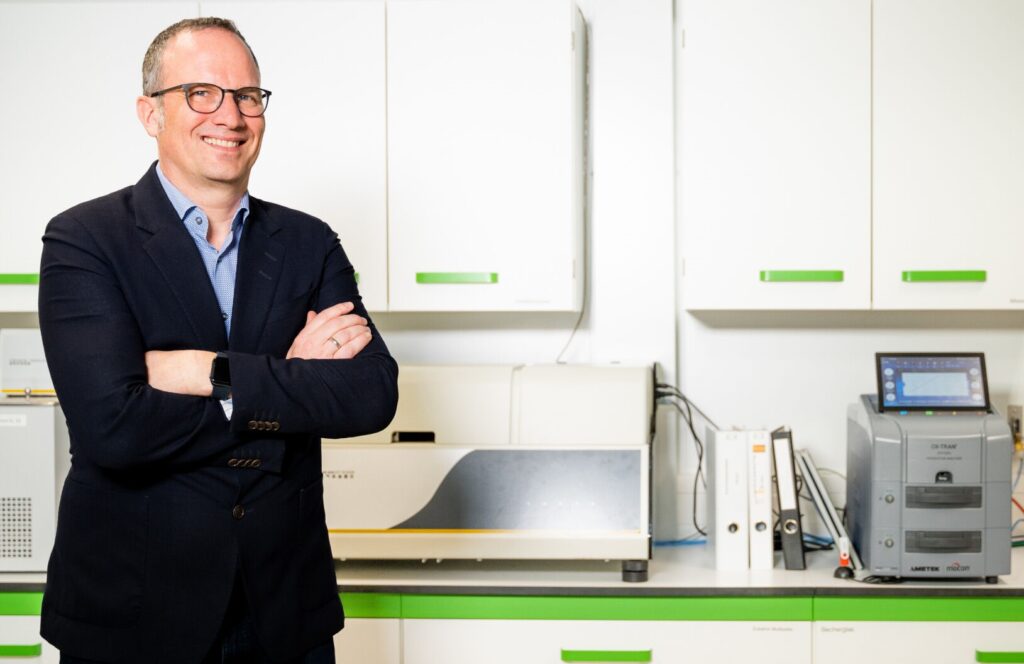Next-generation barrier papers are replacing non-recyclable packaging materials in even more food and non-food applications. DELSCI creates minimum viable prototypes that can be tested on customer packaging lines before being industrialized.
Revolutionizing paper food packaging, no less. DELSCI’s innovations keep on the beneficial, sustainable properties of paper component – as being recyclable or compostable. On the other side, they protect the packed items over a long shelf life. For example, fat goes through paper but can be stopped with a fantastic material – plastic. It can be in all forms, very cheap to produce, very versatile. But, if you throw it away, accidentally or not, it will stay there forever. ”So, we want to combine both properties, sustainability and protection, of those components, paper and plastics”, Johannes Zipfel, Managing Director, and Chief Scientist at DELSCI, explained. ”We want to offer a viable alternative to plastics,” Zipfel said. ”Both in terms of sustainability and performance. There is nothing worse than claiming to be sustainable in packaging, but then creating food waste because of inferior packaging material. ”That is why DELSCI long term strategy is to keep on developing sustainable and highly functional packaging materials for ever more demanding applications.
The Hardest Challenge: Potato Chip Bags
The most demanding application in food packaging is something like nuts, potato chips or coffee. Potato chip bags are made of plastic, paper and aluminium foil, laminated together. Not even plastics would hold fat or moisture completely. Even traces of water make them no longer crispy and people would not like to eat it anymore. ”This is the level of application, which we yet cannot reach with paper, on the short term. A bit less demanding challenge could be a chocolate bar or bakery products, which also need protection,” Zipfel contemplated. ”We are actively working and testing the most demanding application like coffee or potato chips. At the moment, it is not possible to pack them with a pure paper solution.”
Driven By Design
DELSCI was founded in 2020 by the shareholders of Delfortgroup AG, which is an Austrian paper industry company. Delfort has six paper mills in Austria, the Czech Republic, Hungary, Finland and Vietnam. Delfort manufactures special papers, such as sticker, security and cigarette papers.
As an independent research company, DELSCI has more freedom to operate like a startup company, but still has a solid, long term financial background of a family-owned company. It also has the benefit of an access to the market and customers with the help of Delfort. ”We are both R&D and customer driven. The one without the other would not work,” Johannes Zipfel explained.
DELSCI is also driven by design. That is, design thinking is embedded in our team’s thinking. ”As a design for lightweight and circularity are very important for Delfort,” Zipfel said. Also, the paper will have to run on packaging machine. ”Only if you meet all these design guidelines, we can be successful. If one part is missing, we will fail,” Zipfel remarked.
Building A Diverse Team
Born in the Black Forest region of Germany, Johannes Zipfel first studied chemistry in Freiburg and then did his PhD in France, in Grenoble. After working as a postdoc scientist, he decided to do something practical. He entered a large company called Henkel in Dusseldorf, as an R&D project manager. Zipfel headed big teams in Dusseldorf, Vienna and Amsterdam. ”My last role was the head of quality,” Zipfel remembered. ”But then I decided I wanted to really do something new and I got this fantastic offer,” Zipfel said. He got the opportunity of building DELSCI from scratch. He was the first employee. ”Our new team’s background is very, very diverse. Even our origins are from seven different nations. That really thrilled me. It is wonderful to have the opportunity to build up an independent R&D startup within a big company,” Zipfel explained.
First Partners
DELSCI’s collaboration with KCL started on very early stages of the company, as the first partner in its research and manufacturing process. ”We didn’t yet have our own pilot lab, only plans on a A4 sheet paper,” Zipfel remembered. “And we knew that the step from an A4 sheet to a big paper machine is too big.” In its short history, DELSCI has already run ten test trials with KCL. ”We found out that KCL offers exactly that kind of service, we need: The possibility to try out in under industrial condition, with industrial speed, but without industrial costs, e.g. meaning slimmer paper rails instead of the full size machines.”
This is a step DELSCI needs to fine tune its formula to optimize runnability and to change something which is not running. ”We really can say when: It rocked with KCL! We also found the success on the paper machines really very, very valuable,” Zipfel remembered. ”What’s also important is not only the equipment and the machines, but also the people behind the service collaboration.”
DELSCI found the collaboration with KCL very helpful, especially in the beginning. ”We got very valuable input from KCL. These are steps with new concepts, taken before going to the big machines, are the most important and most critical,” Zipfel reminded. ”It’s extremely challenging to make it run on an industrial scale with industrial speed.” He emphasized, that need also as crucial to get customer feedback in early stages of the product development in order to improve the paper. And with the collaboration with KCL, that is possible.
The fact that Delfort, the mother company of DELSCI, has a facility in Finland, helps its collaboration with KCL, also located in Finland, in many ways. Also, the Finnish wood and pulp industry have a strong history. There is a tradition of ambitious research on this field, and thus quite a few good experts and specialists. ”We can also communicate with the KCL team in Finnish, even if – of course – they all are fluent in professional English. This is really, really great.”
EU To Encourage New Solutions
The European Union is taking more and more strict stand against virgin materials, especially in plastics. DELSCI’s Johannes Zipfel believes that the EU regulations should push the usage of new renewable solutions without forbidding the current solutions. ”We would like to have an encouragement for the brand owners, also. It could be with less taxation or other benefits if companies move to from, say plastics to papers,” Zipfel suggested. New solutions need new investments, so also the brand owners need to have business incentives to invest in the shift e.g. from plastics to renewable materials.
The Future In Renewable Coating Materials
Renewable coating materials will supersede polymers in the near future, DELSCI and its director, Johannes Zipfel believes. “In the next five years, our focus will be on renewable coating materials. Our first prototypes are already coming to the market.” Today, also DELSCI still has to rely on fossil polymers, too – for performance reasons. ”We do not want to compromise on performance. But our vision is to replace that fossil part of the existing coating with renewable one. And here we are also actively do long term collaboration,” Zipfel proclaimed. ”And this is our vision for the future to be really leading with fully renewable, ideally having the same performance as the existing package materials. We still have a long way to go. But we think it’s possible.”
Text and photo: Jan Erola

